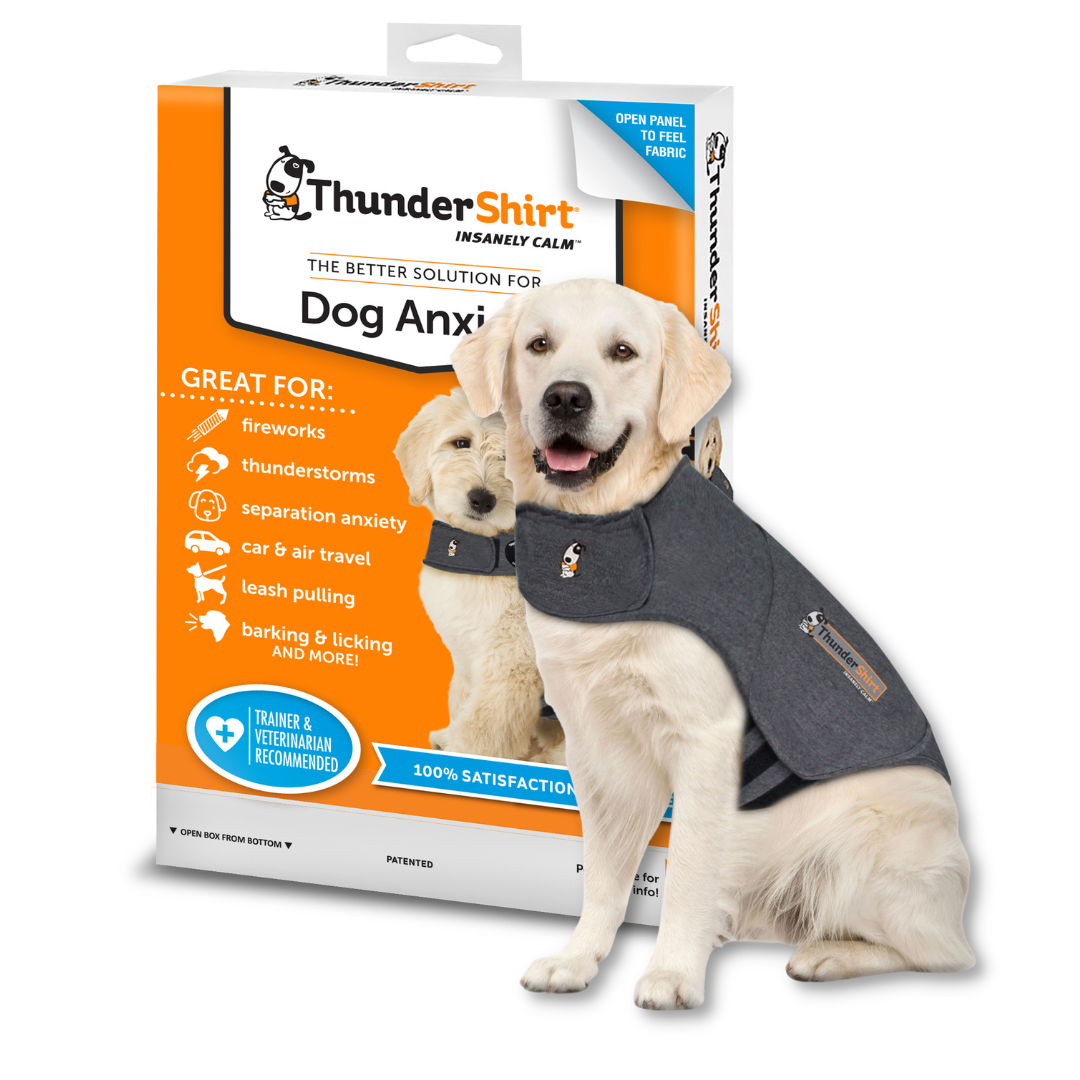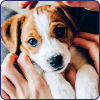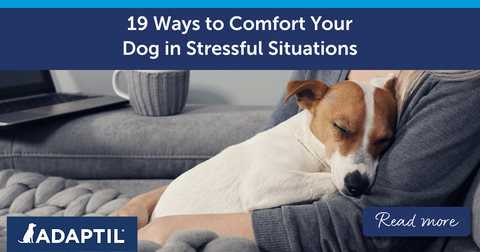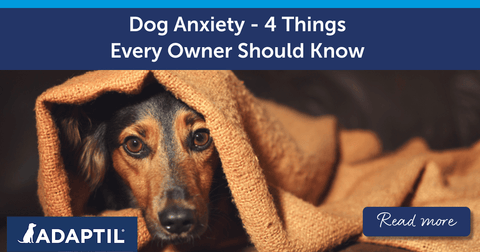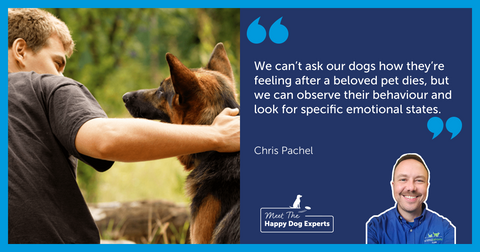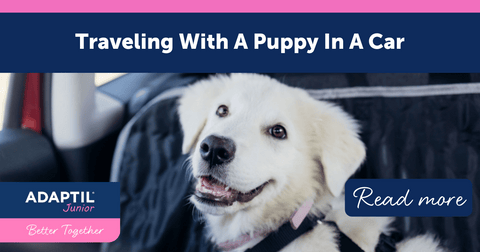Want to subscribe to our blog?
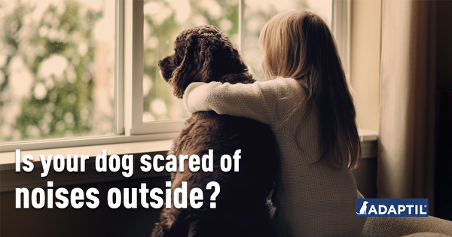
Is Your Dog Scared of Noises Outside? 8 Ways to Help
Written by Adaptil, published on April 18, 2023
Is your pooch sometimes spooked by noises outside? Your doggo may be full of fun and energy, but dogs are often scared of fireworks or things in their surroundings that they don't understand.
If outdoor sounds have got your doggo dashing under the furniture, it's important to understand that dogs have extremely sensitive hearing and can hear things humans can't! Imagine how frightening it is when loud noises happen without any warning or explanation - your doggo doesn't realise sometimes loud and scary noises like fireworks are safe - and they can't prepare themselves for the sound!
How Do You Know if Your Dog is Afraid of Loud Noises?
Fear of loud noises is common in dogs and many owners report that their dogs show signs of fear as a result of loud sounds - like fireworks or thunderstorms. Some pooches display obvious signs of fear when they hear a loud noise, such as running from the sound, pacing up and down, being destructive, trembling, urinating, barking, or whining.
Other dogs may have more subtle ways of showing distress, such as clingy behaviour, excessive salivation, yawning, change in appetite, or licking lips. Even if the signs are subtle, they may be just as distressed! So, it's important to recognise when your pooch is anxious so that you can help them.
8 Things You Can Do To Help Your Dog
1. Avoid getting too close to the source of the noise
If you're expecting a fireworks display or you are aware that there are storms forecast, ensure you keep your doggo indoors rather than taking them outside. For example, walking your dog earlier in the day will help you avoid having to exercise them when there is a chance of fireworks.
2. Block out sounds as much as possible!
Shutting windows and doors as well as pulling curtains or blinds can help to muffle loud noises. You can also consider playing music or having the TV on to help block unexpected sounds. If you're expecting fireworks or storms then turn the lights on so any flashes from the fireworks or lightning don't seem so alarming for your doggo! Take a look at our Calming Music for Dogs Playlist on YouTube for 15 hours of relaxing sounds.
3. Stick to your usual routine
Dogs can get alarmed when they notice their human is acting strangely! Even going over to the window to look out more than usual can alarm them and make them more concerned about what is going on outside - especially if it's accompanied by noise. Try and stick to their usual routine, including bathroom breaks and take them out to the toilet before any fireworks start if you can. Understand that the sound is concerning for your pooch so don't get angry if they are rushing about in fear - any anger would frighten them more, and be counter-productive. Act calmly and reward your doggo when they remain calm too.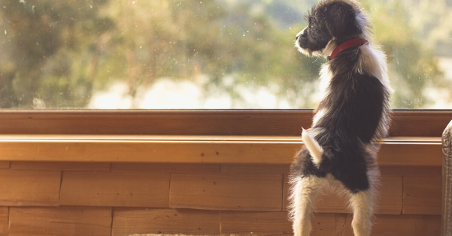
4. Create a den for your doggo!
Whenever you're feeling a bit stressed, you may like to retreat to the sofa with loads of blankets! Your doggo also likes to seek comfort in a cosy den so consider creating one that they can retreat to when there are fireworks, thunderstorms or other loud noises.
Try and make their safe, secure den as soundproof as possible! Make the space quite small so that they will feel more secure - dogs sometimes like to squeeze into a smaller space to feel better hidden. Consider using an under-stairs cupboard filled with blankets, or an indoor kennel or crate that you can put more blankets inside. You can also cover it with a thicker blanket to help mask the sound.
5. Train your doggo to use his den
Try to introduce your doggo to their den when there are no scary noises or flashes so that they become familiar with it - this way they'll come to think of it as a safe space! If you only introduce your doggo to the space when there are loud noises, they may associate it negatively and not use it. Never force your doggo into a particular space and if they hide away, it's best to leave them alone - this is a doggy way of coping. Approaching your dog or trying to move them could scare them further and may even cause aggression.
6. Should you give your dog attention?
Your dog may look to you for reassurance when worried by noises. This is ok as a short-term solution - however, in the long term, it's best that your dog is able to comfort themselves. Especially as thunderstorms will likely be at night when you're asleep! It's also important that your dog knows where to go to feel secure when you're not at home. As this is a more long-term training goal, you should still provide your dog with comfort if they are panicking.
7. Seek professional advice
.png)
If you find that your dog is getting increasingly worried by loud noises, it's best to contact your vet to check if there's an underlying health problem that could also be causing their behaviour. Your vet can also advise on medication to help your dog if necessary. You can also consider finding a qualified behaviourist to help you train your dog to feel calm by themselves. It's important to address fear of fireworks or other loud noises as this can escalate to a phobia of loud noises.
Get more expert advice in our Desensitisation E-book, download your FREE copy today for step by step guides and positive training tips and techniques to reduce your dogs long-term fear of fireworks. Start now to help your pet build up tolerance to loud, unexpected noises and be rewarded with a calmer pet come fireworks season.
8. Gradually get your dog used to loud noises
You can gradually teach your dog that noises are not scary by playing recorded versions of the noises they are afraid of. This is called desensitisation. You should start at such a low volume that your pooch isn't concerned by them and increase it gradually. The volume and direction of sounds should be changed so slowly over time that it won't be frightening for your doggo. Always reward your doggo for calm and relaxed behaviour so that they learn loud noises are nothing to be afraid of; never punish them for showing signs of fear.
Help your doggo feel calm!
Use these tips to help comfort your pawsome pal! It's important to teach them to use their comfy den from early on to help prepare them for loud noises. You can also consider using an ADAPTIL Calm Home Diffuser to help your pooch stay calm and adapt to new situations like staying home alone, loud noises, or dealing with fears. This is clinically proven and recommended by vets to create a reassuring environment for your dog - use continuously to provide constant comfort to your pooch.
Following our expert tips will help to ensure your bond with your dog goes from strength to strength.
Make sure to join our community for weekly advice from our dog behaviour experts as well as product offers and competitions.
 Related Posts
Related Posts
Legal notice The information collected is intended for Ceva Santé Animale and the group in order to manage your requests. This information can be shared with service providers in order to organize their management. In accordance with the General Data Protection Regulations, you have the right to access, rectify and limit the processing of your data. You can also, in certain cases, object to the processing, withdraw your consent and request the deletion and portability of your data. For any request in relation to your personal data, please visit this page.




















